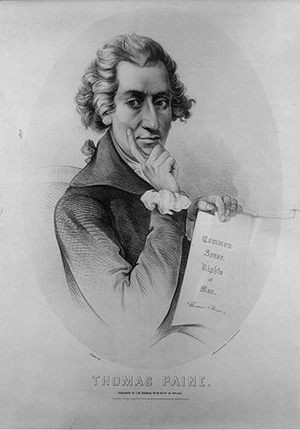Historic Document
Common Sense (1776)
Thomas Paine | 1776

Library of Congress, Prints and Photographs Division
Summary
One of the all-time American bestsellers, Thomas Paine’s Common Sense exploded on the scene in January 1776, at a precarious moment when reconciliation with Great Britain seemed unlikely yet, to many, independence still seemed unthinkable. In electric prose, Paine, a recent English immigrant, made a forceful case in defense of separation. On multiple scores, the pamphlet radiated a radical democratic spirit. In plain, unadorned writing, it appealed to the common capacities of all people to evaluate the case for independence. It left few traditional hierarchies untouched, meanwhile, nowhere more strikingly than its vigorous condemnation of the institution of monarchy, which Paine claimed was in fact an affront to God. Common Sense seized public opinion, propelling American colonists toward independence.
Selected by

William B. Allen
Emeritus Dean of James Madison College and Emeritus Professor of Political Science at Michigan State University

Jonathan Gienapp
Associate Professor of History at Stanford University
Document Excerpt
“But there is another and greater distinction for which no truly natural or religious reason can be assigned, and that is the distinction of men into KINGS and SUBJECTS. Male and female are the distinctions of nature, good and bad the distinctions of Heaven; but how a race of men came into the world so exalted above the rest, and distinguished like some new species, is worth inquiring into, and whether they are the means of happiness or of misery to mankind.
…
These portions of scripture are direct and positive. They admit of no equivocal construction. That the Almighty hath here entered his protest against monarchical government is true, or the scripture is false. And a man hath good reason to believe that there is as much of kingcraft as priestcraft in withholding the scripture from the public in popish countries. For monarchy in every instance is the popery of government.
To the evil of monarchy we have added that of hereditary succession; and as the first is a degradation and lessening of ourselves, so the second, claimed as a matter of right, is an insult and imposition on posterity. For all men being originally equals, no one by birth could have a right to set up his own family in perpetual preference to all others for ever, and tho’ himself might deserve some decent degree of honours of his contemporaries, yet his descendants might be far too unworthy to inherit them. One of the strongest natural proofs of the folly of hereditary right in Kings, is that nature disapproves it, otherwise she would not so frequently turn it into ridicule, by giving mankind an Ass for a Lion.
…
In the following pages I offer nothing more than simple facts, plain arguments, and common sense: and have no other preliminaries to settle with the reader, than that he will divest himself of prejudice and prepossession, and suffer his reason and his feelings to determine for themselves: that he will put on, or rather that he will not put off, the true character of a man, and generously enlarge his views beyond the present day.
…
Small islands not capable of protecting themselves are the proper objects for government to take under their care; but there is something absurd, in supposing a Continent to be perpetually governed by an island. In no instance hath nature made the satellite larger than its primary planet; and as England and America, with respect to each other, reverse the common order of nature, it is evident that they belong to different systems. England to Europe: America to itself.
…
I shall conclude these remarks, with the following timely and well-intended hints. We ought to reflect, that there are three different ways by which an independancy may hereafter be effected; and that one of those three, will, one day or other, be the fate of America, viz. By the legal voice of the people in Congress; by a military power; or by a mob: It may not always happen that our soldiers are citizens, and the multitude a body of reasonable men; virtue, as I have already remarked, is not hereditary, neither is it perpetual. Should an independancy be brought about by the first of those means, we have every opportunity and every encouragement before us, to form the noblest, purest constitution on the face of the earth. We have it in our power to begin the world over again. A situation, similar to the present, hath not happened since the days of Noah until now. The birthday of a new world is at hand, and a race of men, perhaps as numerous as all Europe contains, are to receive their portion of freedom from the events of a few months. The reflection is awful, and in this point of view, how trifling, how ridiculous, do the little paltry cavilings of a few weak or interested men appear, when weighed against the business of a world.
…
WHEREFORE, instead of gazing at each other with suspicious or doubtful curiosity, let each of us hold out to his neighbor the hearty hand of friendship, and unite in drawing a line, which, like an act of oblivion, shall bury in forgetfulness every former dissention. Let the names of Whig and Tory be extinct; and let none other be heard among us, than those of a good citizen; an open and resolute friend; and a virtuous supporter of the RIGHTS of MANKIND, and of the FREE AND INDEPENDANT STATES OF AMERICA.”



